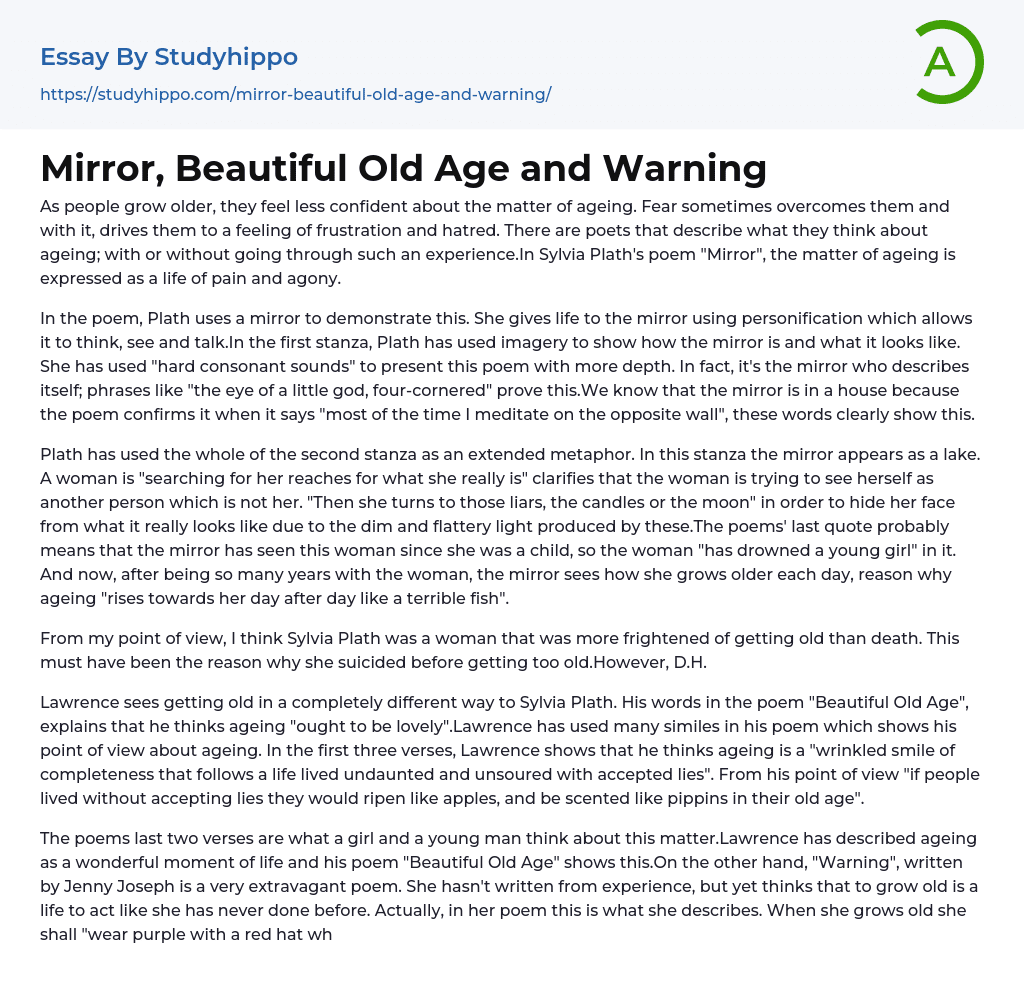As people grow older, they feel less confident about the matter of ageing. Fear sometimes overcomes them and with it, drives them to a feeling of frustration and hatred. There are poets that describe what they think about ageing; with or without going through such an experience.In Sylvia Plath's poem "Mirror", the matter of ageing is expressed as a life of pain and agony.
In the poem, Plath uses a mirror to demonstrate this. She gives life to the mirror using personification which allows it to think, see and talk.In the first stanza, Plath has used imagery to show how the mirror is and what it looks like. She has used "hard consonant sounds" to present this poem with more depth. In fact, it's the mirror who describes itself; phrases like "the ey
...e of a little god, four-cornered" prove this.We know that the mirror is in a house because the poem confirms it when it says "most of the time I meditate on the opposite wall", these words clearly show this.
Plath has used the whole of the second stanza as an extended metaphor. In this stanza the mirror appears as a lake. A woman is "searching for her reaches for what she really is" clarifies that the woman is trying to see herself as another person which is not her. "Then she turns to those liars, the candles or the moon" in order to hide her face from what it really looks like due to the dim and flattery light produced by these.The poems' last quote probably means that the mirror has seen this woman since she was a child, so the woman "has drowned
a young girl" in it. And now, after being so many years with the woman, the mirror sees how she grows older each day, reason why ageing "rises towards her day after day like a terrible fish".
From my point of view, I think Sylvia Plath was a woman that was more frightened of getting old than death. This must have been the reason why she suicided before getting too old.However, D.H.
Lawrence sees getting old in a completely different way to Sylvia Plath. His words in the poem "Beautiful Old Age", explains that he thinks ageing "ought to be lovely".Lawrence has used many similes in his poem which shows his point of view about ageing. In the first three verses, Lawrence shows that he thinks ageing is a "wrinkled smile of completeness that follows a life lived undaunted and unsoured with accepted lies". From his point of view "if people lived without accepting lies they would ripen like apples, and be scented like pippins in their old age".
The poems last two verses are what a girl and a young man think about this matter.Lawrence has described ageing as a wonderful moment of life and his poem "Beautiful Old Age" shows this.On the other hand, "Warning", written by Jenny Joseph is a very extravagant poem. She hasn't written from experience, but yet thinks that to grow old is a life to act like she has never done before. Actually, in her poem this is what she describes. When she grows old she shall "wear purple with a red hat which doesn't go, and doesn't suit her".
The poem has many more aspects of how she will
behave: "I shall spend my pension on brandy and summer gloves and satin sandals, and say we've no money for butter". The poem describes herself as an irresponsible and playful person.Joseph thinks that her life nowadays is boring because she has to "have clothes which keep her dry and pay the rent and not swear in the street and set a good example for the children". Now Joseph can't do these things because she is still young, but when she grows older she will be able to live the way she wants to. She won't have to be nice to people anymore nor show an example to the children.In the last verse she says that "maybe she ought to practise a little now" because then "people who know her are not too shocked and surprised".
- Book Summary essays
- Metaphor essays
- Reader essays
- Rhyme essays
- Literary devices essays
- Villain essays
- Books essays
- Genre essays
- Literary Criticism essays
- Writer essays
- Protagonist essays
- Simile essays
- Poem essays
- Book Report essays
- Book Review essays
- Greek Mythology essays
- Plot essays
- Tragic Hero essays
- Coming of Age essays
- Play essays
- Rhetoric essays
- Rhetorical Question essays
- Translation essays
- Understanding essays
- Reason essays
- Character essays
- Letter essays
- American Literature essays
- Literature Review essays
- Utopia essays
- Poetry Analysis essays
- Dante's Inferno essays
- Between The World and Me essays
- Incidents in The Life of a Slave Girl essays
- Flowers for Algernon essays
- Myth essays
- Everyday Use essays
- Boo Radley essays
- Genesis essays
- Richard iii essays
- Alice in Wonderland essays
- On the road essays
- Ozymandias essays
- The Nightingale essays
- Holden Caulfield essays
- Animal Farm essays
- 1984 essays
- A Hanging essays
- Shooting An Elephant essays
- A Tale Of Two Cities essays




